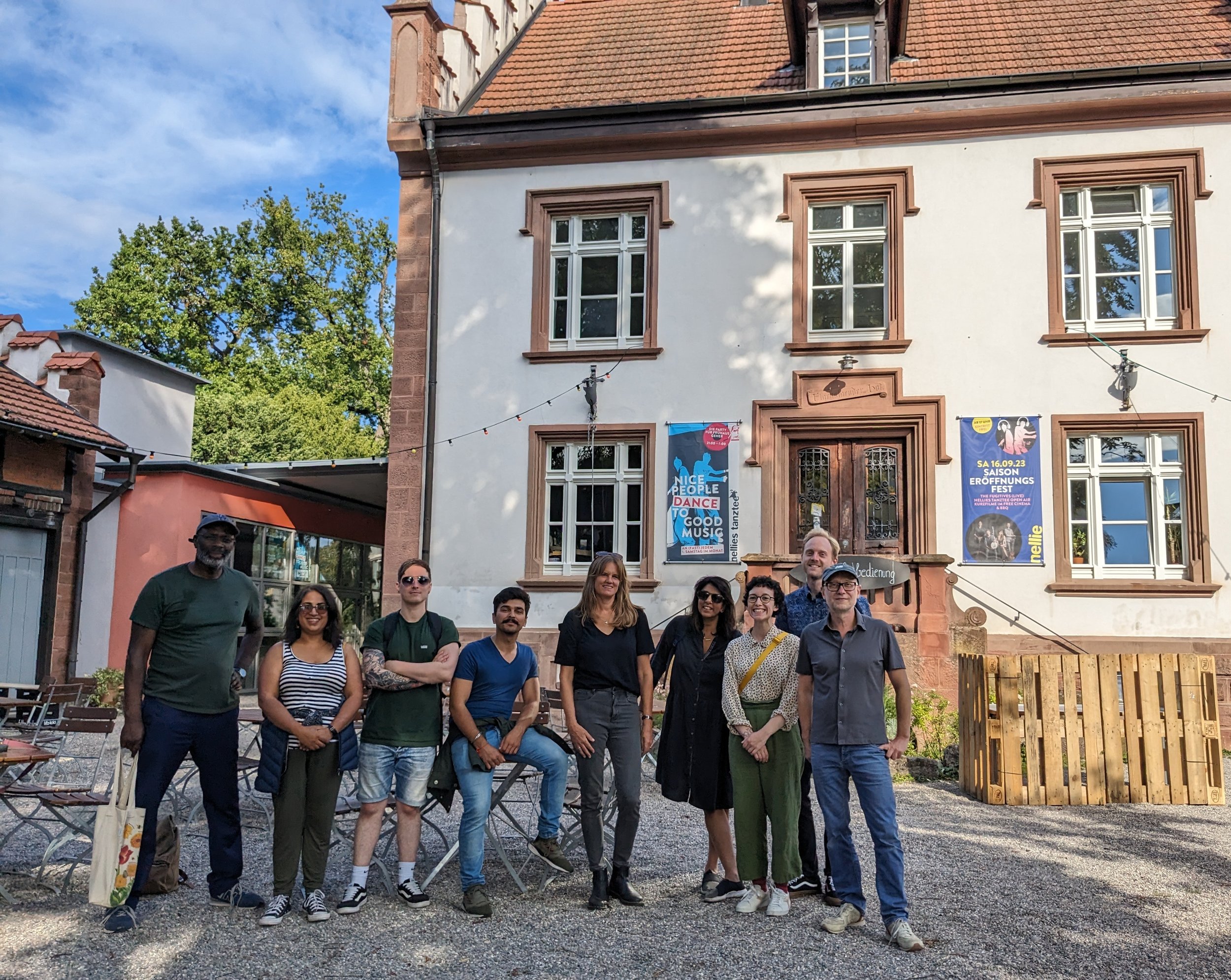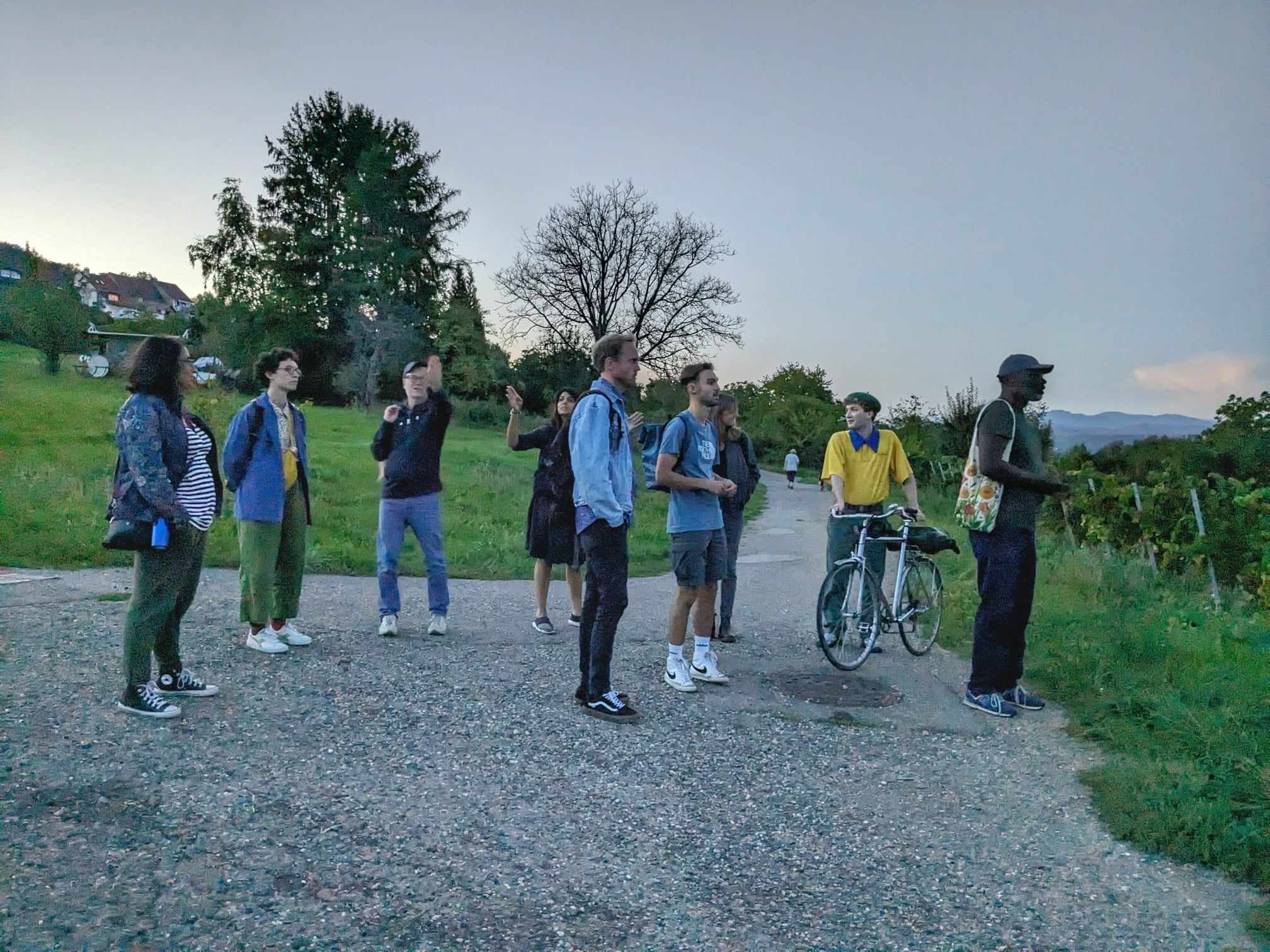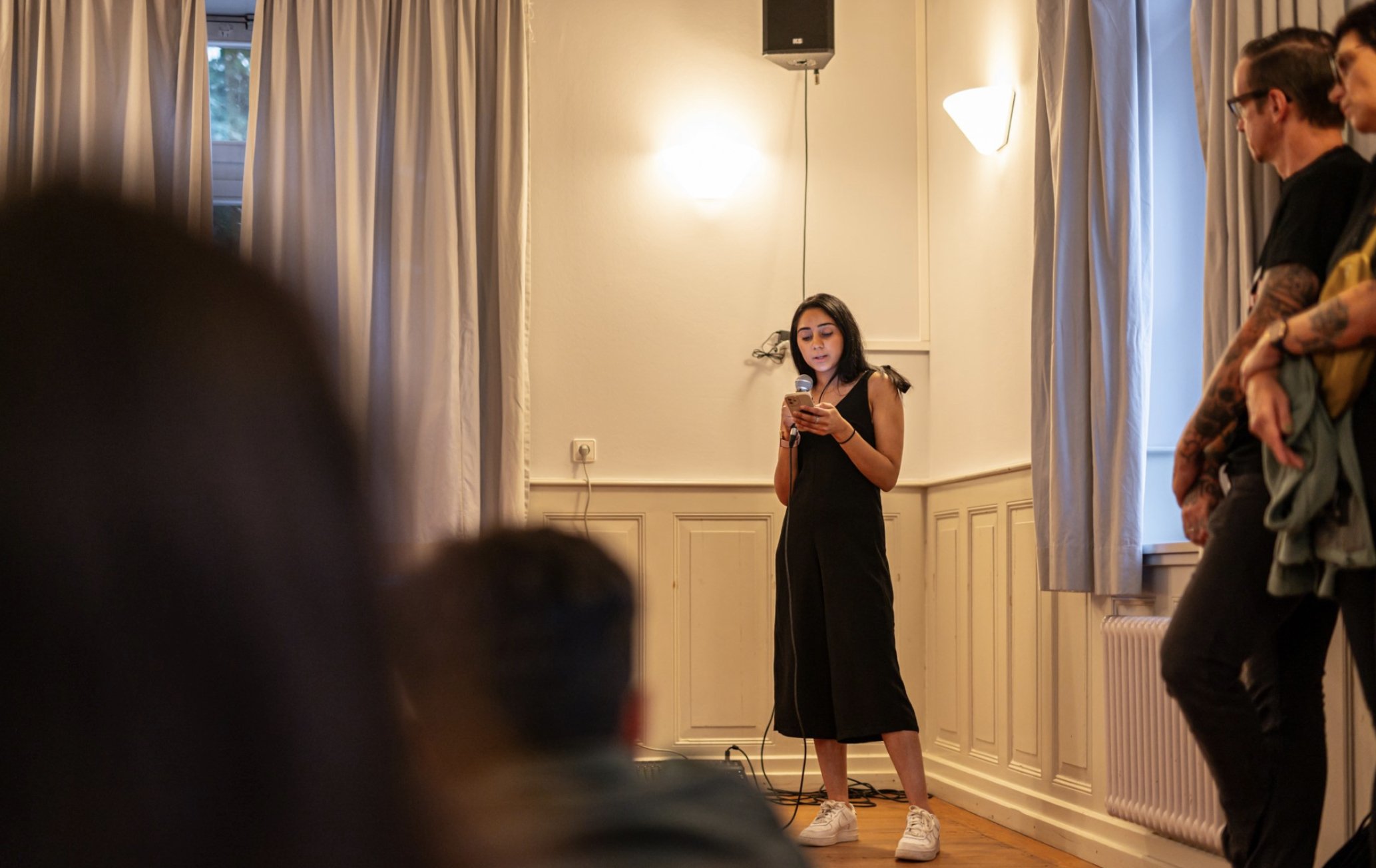Case Study: Cultural Bridge – ENTER Tier 2
Making the most of… international partnerships and connections.
Launched in 2021, Cultural Bridge is a national programme which aims to forge international partnerships and foster creative collaborations between the UK and Germany. Jointly funded and led by all of the UK Arts Councils and leading German cultural institutions, it “supports intercultural exchange and dialogue in the field of participative arts and culture” (www.creativeblackcountry.co.uk/cultural-bridge-2023). This case study explores the continued development of the “ENTER” partnership between CBC and Kulturvilla Nellie, a cultural centre in Lörrach, south-west Germany.
Supporting early career creatives
CBC’s three Culture Volunteers, emerging creatives Anisha, Ajay and Tod visited Kulturvilla Nellie in September 2023 to partake in an exchange programme involving artistic explorations of climate activism. Volunteers from Kulturvilla Nellie had visited the UK earlier in the year, and this was the second phase of the partnership. As well as comparing ideas and approaches to practice with peers at Kulturvilla Nellie, artists had the opportunity to visit museums, galleries and cultural sites in other parts of Germany, including Basel and Mannheim. During the trip, each artist also presented their ideas and excerpts of work-in-progress during the opening festival weekend of Kulturvilla Nellie’s season.
For these early career practitioners, Cultural Bridge was seen as “a new opportunity and a new challenge”, with the potential to “raise awareness” about climate change and spread positive messages about climate action to a wider audience. One of the artists was motivated to participate as they felt it was a unique offer which “would propel my career”. For another, it gave them the space to explore and realise ideas initially developed during the COVID19 lockdown. The opportunity to collaborate with others and reach into local communities was particularly appreciated.
“I was inspired to be part of a project that collaborates with other artists across borders, forging connections with a city and people in Lörrach that I could observe and learn from… I believe that collaboration is a great source of inspiration and can help to create a ripple effect within local communities” (Artist feedback)
The programme “empowered them to develop their own practice, at their own pace” and for some participants, it was also their first opportunity to share work publicly. For one of the artists, hearing her poem performed by a spoken word artist was a highlight of the project. Artists have since been inspired to seek out a wider range of opportunities due to their participation in the ENTER project. For example, one artist was invited to present their poetry at Newhampton Art Centre’s recent “Save Your Planet” event.
Participants agreed that the programme enabled them to network effectively, build good working relationships and achieve greater visibility for their work. They connected with a variety of people not just at CBC and Kulturvilla Nellie but also with German universities, galleries/museums and cultural festivals. In this way the experience enabled them to develop “a more international network” One artist described it as an opportunity to become more interconnected, “put myself out there and introduce myself to more people”.
Although it was commented that the time-limited nature of the exchange did not leave much space for reflection, one artist felt this actually gave the work greater urgency and fostered a “now or never” mentality that inspired them to create – and collaborate. Introducing artists to international perspectives widened their sense of “where to look for ideas and inspiration” for their work and it was felt that the ENTER project had been a “catalyst” for further thinking and co-creation. Artists agreed that there is definitely more to be said and done moving forward, and that this exchange was just one step in an ongoing process of shared discovery and collaboration.
“Both sides of this ‘Cultural Bridge’ have gifted me an unforgettable experience. It’s provided an opportunity to explore themes around climate change with a wonderfully talented group, whilst visiting amazing locations, rich in history, arts and culture.” (Artist feedback)
One of the most exciting outcomes of working in partnership was developing a more intercultural way of thinking, exploring different ideas, perspectives and approaches to climate change. For example, one of the artists was struck by the contrast between a “bleak, negative and fatalistic” outlook in the UK, and Germany’s much more constructive, “solution-based” approach, which was reflected in some art exhibitions that explored the potential of new technologies to tackle climate change.
Arts, communication and self-learning
Another participant found that the intercultural exchange of ideas, perspectives and experiences led to “hugely important conversations about the environment”, which continue to inform his creative practice. Because of this, he cited the combination of “arts, communication and self-learning” as a highlight of the programme. This included the benefits gained from placing different types of artists in dialogue (e.g. visual art, performance art and spoken word), which were described as “opening up a whole new branch of mixed practice”. Another participant also found that collaborating with artists working in different styles and mediums has been insightful and encouraged her “to create something jointly” with other artists in future.
“It’s really important they have the opportunity to develop as international artists with international experiences, cultural connections that are memorable and platforms for moving onward. They will have forged links with local and wider communities, opening doors for the creatives here and abroad, as champions for change.” (Facilitator feedback)
Participants recommended other early career artists to work with CBC, who were described as “supportive”, “helpful” and “inviting”. One in particular said that CBC understood and accepted their work for what it was, noting that “this kind of support of really important as an artist”. Another noted that CBC had given them an invaluable “platform to showcase my work and my passion”. They were keen to work with CBC again and felt they were supported to get the most out of the Cultural Bridge opportunity.
“CBC want to push people out there, they want to promote up and coming artists and get their work seen… They want to bring fresh new faces and voices to the forefront” (Artist feedback)
For CBC, the ENTER project aligned with their focus on mentoring as a key method of supporting arts and cultural initiatives and practitioners. One of the Creative Advisors from CBC felt that the young people involved in the project learnt a lot, and that the shared goal of climate activism and sustainability brought them together not just personally, but creatively. He felt that the “cross-fertilisation” of ideas and practices gained from international partnership is vital as “it forces arts organisations to stop looking inside”. In this case, it also laid the foundations of “long-term collaboration” for the young artists involved.
The project facilitator for ENTER Tier 2 had previously taken part in Tier 1 as a visual artist specialising in photography/installation. In this second phase she was involved in the recruitment of artists, curating a range of activities and planning, as well as guiding and monitoring the group’s progress. This enabled her to develop project management skills.
As she already had firsthand experience of being involved in the exchange programme, the facilitator was ideally placed to take on a mentoring role, helping the participants thrive and get the most out of the project. She wanted to help pass on this opportunity to other young artists to “launch their career” and network/collaborate effectively with each other. She was motivated by “wanting them to explore what climate change meant to them [and] how to share this with others”.
The facilitator found the experience of working on an international project to be “rewarding and positive” as well as fulfilling to see “meaningful connections develop over time”. She observed that the artists worked more collaboratively as the project developed. In this way, a highlight was “watching them develop in their practice” and seeing their gradual growth, progression and improved confidence both individually and as a group of creatives. She also commented that it’s good to see such enthusiasm among artists who have actively continued to cultivate links with Kulturvilla Nellie /Germany since the project concluded.
“As a project facilitator I have further developed my project management and organisational skills, such as exploring themes through co-design sessions with German partners and artists from the UK, arranging numerous talks and activities… I have forged good communication networks for the future” (Facilitator feedback)
Since September, the Culture Volunteers have co-produced a short film, which featured at the Wolverhampton Literature Festival in February 2024, premiering alongside spoken word performances and a Q&A with artists. The film will also be screened in Lörrach at a later date, and artists hope to showcase the products of their collaboration at other events and exhibitions.
One of the aims of the Cultural Bridge programme was to kickstart collaborations and work which will continue beyond the lifespan of the project itself. Participants shared a belief that this project was “a seed planted "and observed that “it doesn’t feel like it’s the end…This can go further”.
All artists shared their enthusiasm to work with Kulturvilla Nellie again in future. One has already returned to give a talk at their sustainability week and is particularly keen to explore other parts of the country and develop connections further (with Kulturvilla Nellie, universities and other artists). This artist has even been inspired to learn the German language in the spirit of pursuing further collaboration across Germany. He feels none of this could have happened without Cultural Bridge enabling him to forge the initial relationship with Kulturvilla Nellie and “do a lot of things I’ve never done before”.
Based on their experience of Cultural Bridge, participants felt that CBC should explore more international partnerships, extending a similar experience to other creatives. In their view these kinds of intercultural opportunities are enriching because they have the potential to widen or even change people’s perspective. They believed that CBC should continue to support local and international work, as “there is space for both” and international partnership work aligns with CBC’s emphasis upon co-creation and collaboration. In this case, it was felt that using intercultural collaboration to explore climate change helped reach into communities and foster a sense of collective agency.
“The local communities have become more empowered through having additional young creatives who they can invite to their activities and events. These emerging artists have collectively worked together with the goal to make local communities more conscious of the small changes they can make around climate change.” (Facilitator feedback)



